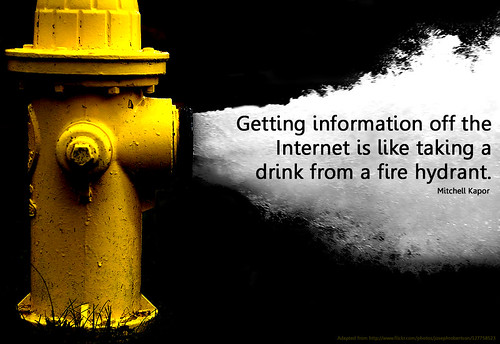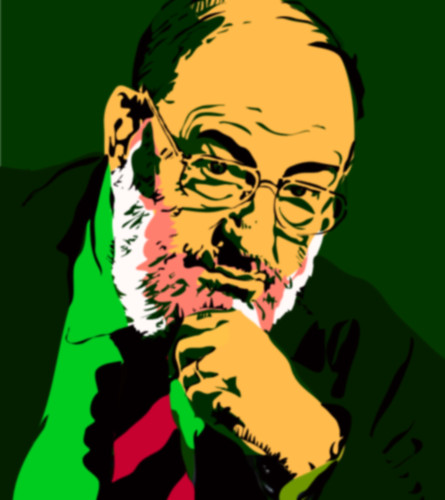As part of a self-study accreditation process, our school has invited staff to consider the question of what learning is -- for three hours on a Saturday morning. Reps from each grade/area should be in attendance -- and each person is asked to bring along a book, article, or reference. I know what mine will be.
Engaging Minds: changing teaching in complex times -- 2nd ed, 2008 -- by Brent Davis, Dennis Sumara, and Rebecca Luce-Kapler.
Here are some bits.... taken from my notes.....
Learning is about becoming attentive to things you never noticed before -- becoming conscious -- becoming aware.
Teachers play a pivotal role in orientating attentions in ways that prompt transformations in personal perception and consciousness -- helping people to notice what they haven't noticed.
Education is not about compelling others to see the world in the ways we see it, but in terms of expanding the space of the possible.
The metaphor of the teacher as "the consciousness of the collective" -- expanding the space of the possible and "creating conditions for the emergence of the as-yet unimagined".
Prompting change or learning is a matter of disequilibrium.... with the teacher in the middle, mediating, mentoring -- giving voice and advocating... opening up spaces for collective action, not defining the action.
Teaching is not about what the teacher does, it's about what happens to the learner.
Learning is complex, full of recursive elaboration... iterative processes and nested systems.
"A complexified conception of curriculum would suggest an image more like a phase space or a fractal tree, in which each event opens up new possibilities for action, which in turn open still other divergent possibilities. There is no particular direction -- except, perhaps, toward the expansion of the space of the possible."
A teacher is constantly perturbed and being perturbed.
Teaching is an event that prompts a complex system to respond differently.
The lesson plan is a thought experiment.
I'm fascinated with the idea of the unknown unknowns*. E.g., see my blog post on Roger Schank. His definition of learning bears repeating:
"Learning to explain phenomena such that one continues to be fascinated by the failure of one's explanations creates a continuing cycle of thinking that is the crux of intelligence."
Karl Hostetler, a professor interested in both philosophy and education -- (download a PDF of his article << What is "Good" Education Research?>> (2005)), quotes Hans-Georg Gadamer (1960/1989) :
"Knowledge always means, precisely, considering opposites. Its superiority over preconceived opinion consists in the fact that is able to conceive of possibilities as possibilities.... [So] only a person who has questions can have knowledge. [However] there is no such thing as a method of learning to ask questions, of learning to see what is questionable. On the contrary, the example of Socrates teaches that the important thing is the knowledge that one does not know."
This potential knowledge is what we as teachers must value -- in ourselves as much as in our students.
Errol Morris, the documentary filmmaker, did a 5-part series of articles on knowing and unknowing in the NYT earlier this year -- "The Anosognosic's Dilemma: Something's Wrong but You'll Never Know What It Is" (Part I) -- in which he interviews David Dunning, a professor who is known for his elaboration of the Dunning-Kruger effect, which is when our incompetence masks our ability to recognize our incompetence.
Dunning:
"Unknown unknown solutions haunt the mediocre without their knowledge. The average detective does not realize the clues he or she neglects. The mediocre doctor is not aware of the diagnostic possibilities or treatments never considered. The run-of-the-mill lawyer fails to recognize the winning legal argument that is out there. People fail to reach their potential as professionals, lovers, parents and people simply because they are not aware of the possible. This is one of the reasons I often urge my student advisees to find out who the smart professors are, and to get themselves in front of those professors so they can see what smart looks like."
Engaging Minds: changing teaching in complex times -- 2nd ed, 2008 -- by Brent Davis, Dennis Sumara, and Rebecca Luce-Kapler.
Here are some bits.... taken from my notes.....
Learning is about becoming attentive to things you never noticed before -- becoming conscious -- becoming aware.
Teachers play a pivotal role in orientating attentions in ways that prompt transformations in personal perception and consciousness -- helping people to notice what they haven't noticed.
Education is not about compelling others to see the world in the ways we see it, but in terms of expanding the space of the possible.
The notion of shared labor -- social learning -- highlighting how complex knowing is distributed across a web of individuals.
The learner is the collective. Knowledge cannot exist independent of the knower -- it is a potential to action both embodied and situated. Bodies know, and that's what makes them part of grander knowing bodies. Knowledge, then is about relationship.
The metaphor of the teacher as "the consciousness of the collective" -- expanding the space of the possible and "creating conditions for the emergence of the as-yet unimagined".
Prompting change or learning is a matter of disequilibrium.... with the teacher in the middle, mediating, mentoring -- giving voice and advocating... opening up spaces for collective action, not defining the action.
Teaching is not about what the teacher does, it's about what happens to the learner.
Learning is complex, full of recursive elaboration... iterative processes and nested systems.
"A complexified conception of curriculum would suggest an image more like a phase space or a fractal tree, in which each event opens up new possibilities for action, which in turn open still other divergent possibilities. There is no particular direction -- except, perhaps, toward the expansion of the space of the possible."
A teacher is constantly perturbed and being perturbed.
Teaching is an event that prompts a complex system to respond differently.
The lesson plan is a thought experiment.
I'm fascinated with the idea of the unknown unknowns*. E.g., see my blog post on Roger Schank. His definition of learning bears repeating:
"Learning to explain phenomena such that one continues to be fascinated by the failure of one's explanations creates a continuing cycle of thinking that is the crux of intelligence."
Piaget said intelligence is what is called on when an agent doesn't know what to do, i.e., discerning what really matters in a situation.
Karl Hostetler, a professor interested in both philosophy and education -- (download a PDF of his article << What is "Good" Education Research?>> (2005)), quotes Hans-Georg Gadamer (1960/1989) :
"Knowledge always means, precisely, considering opposites. Its superiority over preconceived opinion consists in the fact that is able to conceive of possibilities as possibilities.... [So] only a person who has questions can have knowledge. [However] there is no such thing as a method of learning to ask questions, of learning to see what is questionable. On the contrary, the example of Socrates teaches that the important thing is the knowledge that one does not know."
This potential knowledge is what we as teachers must value -- in ourselves as much as in our students.
Errol Morris, the documentary filmmaker, did a 5-part series of articles on knowing and unknowing in the NYT earlier this year -- "The Anosognosic's Dilemma: Something's Wrong but You'll Never Know What It Is" (Part I) -- in which he interviews David Dunning, a professor who is known for his elaboration of the Dunning-Kruger effect, which is when our incompetence masks our ability to recognize our incompetence.
Dunning:
"Unknown unknown solutions haunt the mediocre without their knowledge. The average detective does not realize the clues he or she neglects. The mediocre doctor is not aware of the diagnostic possibilities or treatments never considered. The run-of-the-mill lawyer fails to recognize the winning legal argument that is out there. People fail to reach their potential as professionals, lovers, parents and people simply because they are not aware of the possible. This is one of the reasons I often urge my student advisees to find out who the smart professors are, and to get themselves in front of those professors so they can see what smart looks like."
When I read that, I realized why I love TED Talks so much -- it gives me easy access to seeing what smart looks like. It also gives another angle on the role of the teacher. People like to say 21st century learning demands teachers shift from "the sage on the stage" to the "guide on the side". I think there are times to be the "sage on the stage" -- to exhibit "unnatural acts" of thinking (a la Sam Wineburg -- more re him in a future blog post) -- though overall, I prefer the concept of the teacher as "the meddler in the middle" (Erica McWilliams, 2005).
In an interview Benjamin Barber reflects on the positive aspect of disturbing thoughts:
London: It occurs to me that you are not at all afraid of controversy — not in your statements here and not in your books certainly. You say somewhere in An Aristocracy of Everyone that "with good teaching, as with good art, someone is always offended." Is that really true?
Barber: I think so. I think that if you don't offend someone, you haven't even woken them up, let alone gotten their mental energies going. One thing that does bother me about so-called political correctness — I don't like the term PC — it's really an unfair word, it's kind of a slur in the way that it's used. But the true part of it is that there are some people who seem unwilling to be offended and provocative speech, free speech, and most importantly educational speech — speech that makes people think — has to be to some degree offensive. That's how you get people woken up, that's how you get people caring, that's how you get them reacting.
Another vision of the teacher as a constructive mediator is the grandmother -- in Sugata Mitra's sense -- in his SOLEs (Self-Organized Learning Environments). The person who stands behind you every now and then-- who is there to support you in your own learning.
Isn't that the role of our own PLN (personal learning networks) -- for us as teacher-learners? We just need to make sure we are allowing ourselves to be disturbed. That is the danger for adults... that we move into spaces (mental and physical) which do not regularly perturb us.
* Yes, "unknown unknowns" brings Donald Rumsfeld to mind -- and my favorite packaging of him is in the 2003 Slate article on "The Poetry of Donald Rumsfeld":
The Unknown
As we know,
There are known knowns.
There are things we know we know.
We also know
There are known unknowns.
That is to say
We know there are some things
We do not know.
But there are also unknown unknowns,
The ones we don't know
We don't know.
As we know,
There are known knowns.
There are things we know we know.
We also know
There are known unknowns.
That is to say
We know there are some things
We do not know.
But there are also unknown unknowns,
The ones we don't know
We don't know.
—Feb. 12, 2002, Department of Defense news briefing








